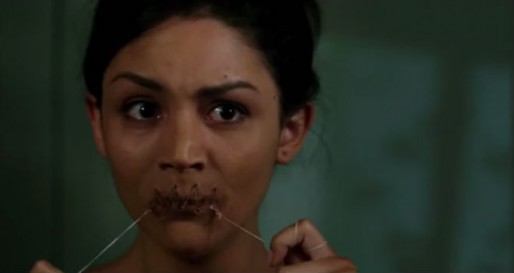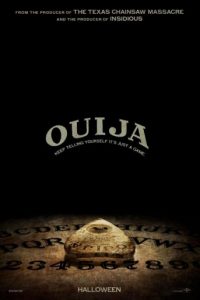When did horror films become so formulaic and boring? That’s the question that I asked myself — not using a spirit board with a planchette — again and again after seeing Ouija. In particular, I’m sick of the screeching ghosts that serve no purpose other than to make an audience jump. I’m sure that there are examples going back decades, but for recent films, I remember these kinds of ghosts starting with The Ring. Such tactics are so pedestrian, and I equate them to the ubiquitous haunted houses and amusement park mazes around Halloween in which they only vary in the settings and the attempts to catch guests off guard as actors jump out. Ouija had so much potential for a spooky story in which spirits haunt the living after contact through the titular board. Instead, it’s a tiresome modern horror flick with cheap scares and an uninteresting cast who could all die as far as I was concerned.
I was immediately turned off by the multiple references to a Ouija board as a “game.” If you look up the history of the product, it traces its origin back to the desires of people to contact the dead. Its transition from séances to living rooms came about because of Parker Brothers, a company known for its board games. For many people, a Ouija board is akin to a Magic 8 Ball in that you ask questions of the device and get answers. There are no rules or ways to win, so to call this board a game is a real stretch that hints at the sneaky tactics the original patent holder used to obtain a patent. When the characters in Ouija talk about “playing” the game and list rules for the board’s use — never play alone, never play in a graveyard and always say goodbye — it doesn’t ring true. My family had one of these things, and we hardly ever used it. When we did, one of us was undoubtedly moving the planchette to spell answers. It’s silly to tie a board game to a horror movie. Jumanji and Zathura: A Space Adventure translated well to fantasies or adventures because there were goals and challenges on the game boards; that technique just doesn’t work for a Ouija board. What’s next? Chutes and Ladders?
Ouija begins with Debbie Galardi (Shelley Hennig) messing around with a Ouija board by herself and the fatal consequences of her actions. This is no spoiler; Debbie’s death drives the flimsy plot. First-time director and special effects expert Stiles White and writing team White & Juliet Snowden (writers of The Possession and cowriters of Boogeyman and Knowing) really don’t offer much creatively. Debbie’s best friend Laine Morris (Olivia Cooke of The Quiet Ones and Bates Motel) is distraught after Debbie’s death and is inspired to attempt contact with a Ouija board when she finds one in Debbie’s house. She rounds up her sister Sarah (Ana Coto), her boyfriend Trevor (Darren Kagasoff), Debbie’s boyfriend Pete (Douglas Smith) and their single friend Isabelle (Bianca Santos) for a spirit session in Debbie’s house with the found Ouija board. As you would expect, the teens contact a spirit and strange things happen to them as a mystery is revealed about the house, Debbie and some other spirits. The rest of the film plays out more like Final Destination than a ghost story.
One of the major problems with Ouija is that I don’t care about any of the teens. They all do stupid things as far as horror movies are concerned like play with a Ouija board at night in a spooky house and walk around with flashlights in the basement, again at night. They don’t have much personality, either. I yearned for the stereotypes of horror movie teen groups like the jock, the brainy one, the hot chick and the vulnerable loner. Instead, I didn’t bother to guess who might live or die. It just didn’t matter to me. Cooke is wonderful in Bates Motel, but she simply can’t find the right starring vehicle. Hennig has the spark of life needed to keep a movie from dying too quickly. Unfortunately, her character dies too soon. The two most interesting characters have limited screen time. Lin Shaye is a wonderful actress who has appeared in the Insidious movies, and she plays a mysterious woman shut away in an institution. It’s a shame that she didn’t join the kiddies in their shenanigans. Vivis Colombetti (credited as Vivis) is perfect as the Morris family housekeeper. She dispenses advice and warns the sisters not to provoke the dead. As with Shaye, I would have welcomed a larger role for Vivis like Zelda Rubinstein in Poltergeist. Alas, that wasn’t meant to be.
All of the casting problems would have minimal impact if Ouija was actually scary. It’s not. There’s a whole lot of waiting going on here between anything happening. I should be engaged and on the edge of my seat instead of waiting for it all to be over. In fact, the filmmakers convinced me that the movie was over when it wasn’t, and I was ready for the credits to roll. I was actually disappointed that there was more, which is the exact opposite of how I should feel when I’m in a theater. Even worse, when the spirits do appear, they’re of the screeching ghost variety, and that wears thin very fast. There’s exactly one chilling scene in the movie that I liked, but it was too little, too late. I was bored with this game.
Amazingly, the trailer for Ouija is better than the entire film. I guess it’s bound to be more exciting when you can eliminate all of the boring parts. They did some deceptive marketing by showing two characters whose eyes roll up to show the whites. Well, that isn’t in the actual movie, and it’s insulting that they made the trailer more frightening that way than the real scenes. As examples of the dumb audience members who lap up this crap, one teenage girl behind me whispered to her friend that this was the scene where the girl’s eyes go white. I guess they fooled her when it didn’t happen that way! “Ouija” is pronounced wee-ja — not wee-gee. Beware of a film that can’t even pronounce its own name properly. Although attributed in one story to an Egyptian word, another explanation for the name is that it combines the French and German words for yes. If you asked me for my recommendation, I would go further and emphatically state non, nein, no, nee and nyet.




